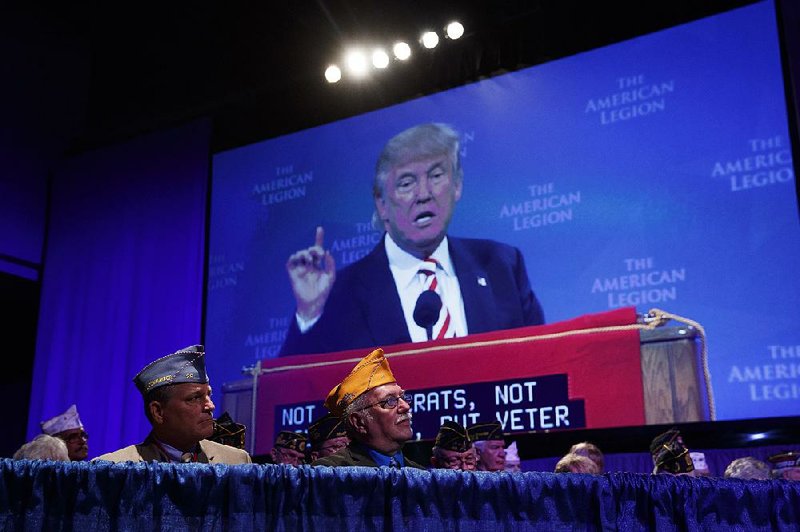CINCINNATI -- Some Hispanic leaders who have been advising Donald Trump say they feel betrayed after his long-awaited immigration speech that definitively ruled out a pathway to legal status for people living in the country illegally.
RELATED ARTICLE
http://www.arkansas…">Trump's plans a 'threat,' says Mexico's leader
FULL ELECTION COVERAGE
Trump stopped short of calling for the mass deportation of millions of people who have not committed crimes beyond their immigration offenses. But he also ruled out what he dismissed as "amnesty," saying those who want to live legally in the U.S. will need to leave and head to the back of the line in their home countries.
"People will know that you can't just smuggle in, hunker down and wait to be legalized," Trump declared in his speech Wednesday night. "Those days are over."
The language caught off guard the Hispanic faith and business leaders who have been advising him. In private meetings, phone calls and in public statements, Trump and his aides had given many the impression that he was prepared to soften his stance on immigration as he tries to court more moderate, general-election voters and boost his standing with Hispanics and members of other minority groups.
Now some feel Trump misled them.
"There's several of us who have gone out on a limb, if you will, to try to at least be at the table of reason with him, and that's left us confused and disappointed," said Tony Suarez, the executive vice president of the National Hispanic Christian Leadership Conference. He's been among those pushing Trump to moderate his stance.
As recently as Monday, he said, the GOP presidential nominee had signaled on a conference call with faith leaders that they could expect to see a gentler, more compassionate Trump in the speech. Trump, Suarez said, was asked explicitly whether they would see a softening or any "hope" for at least some of the people currently living in the shadows.
"He said, 'Yes,' and he thought we would be very pleased on Wednesday," Suarez said. "The impression given on the call was not what we heard last night."
Alfonso Aguilar, president of the Latino Partnership for Conservative Principles, had prominently endorsed Trump after initially opposing his candidacy. He, too, said Trump had signaled a willingness to moderate some of his immigration plans, including limiting his call for deportations to those convicted of crimes.
"At this point, I just don't see how I can support him. So I'm withdrawing my support," Aguilar said. "From a political perspective, this is the end of Donald Trump."
Trump's campaign, however, insisted the businessman had never wavered.
"Mr. Trump has been consistent in advocating for an end to illegal immigration, and he will continue to reach out and work with voters from all communities to defeat crooked Hillary Clinton this fall," said Jason Miller, the campaign's senior communications adviser.
Later Thursday, Trump told Fox News' The O'Reilly Factor that "a lot of people didn't quite understand" part of his immigration speech because of the enthusiastic crowd.
Asked what exactly he would do with the millions of people living in the country illegally who haven't committed other crimes, he responded that after he strengthens the border and gets rid of all the "bad players," like gang members and drug dealers, "we're going to make a decision at that time."
Those speaking out against Trump also included Jacob Monty, a Houston attorney and a member of the candidate's National Hispanic Advisory Council. In a Facebook post, Monty said he was finished supporting Trump after hearing the speech.
"I gave Donald TRUMP a Plan that would improve border security, remove hardened criminal aliens and most importantly give work authority to the millions of honest, hardworking immigrants in the US. He rejected that tonight and so I must reject him," he wrote.
Suarez, who had never endorsed Trump personally, said he would now be focusing his attention on Congress and on electing lawmakers who are more amenable to updating immigration policy.
"We're disappointed, and it's only raised more questions than answers," he said of Trump's speech. "We tried," he said. "You don't always win. We tried."
But the Rev. Mario Bramnick, president of the Hispanic Israel Leadership Coalition and another member of Trump's advisory council, said he would be sticking with Trump because he believes that the GOP nominee still has "a real desire to help the undocumented."
Trump's more conciliatory tone during his surprise visit Wednesday to Mexico, coupled with his private comments and some language in the speech, give Bramnick hope that Trump will one day unveil a plan "that's going to secure the border and that's going to be just and equitable to help the undocumented."
Kaine, Biden take aim
Democratic vice presidential nominee Tim Kaine was critical of Trump's foray to Mexico, dismissing the visit as a bumbling "choke," and warned that the businessman's immigration plan will turn the U.S. into "deportation nation."
"This is kind of a diplomatic amateur hour by Donald Trump," Kaine said on NBC's Today.
Clinton's team seized on the issue of who will pay for a border wall between the U.S. and Mexico, after Trump said the topic of payment didn't arise in his talk with Mexico's leader but President Enrique Pena Nieto said he made clear that his country would not be paying for it.
"That did not come up in a meeting?" Kaine asked Thursday. "He suddenly just choked and forgot to say that?"
Kaine said Trump "sort of folded under pressure."
"Leadership is you got to be consistent -- you can't say different things to different audiences," Kaine said. "When he's looking the leader of Mexico in the eye, he can't bring himself to say it; that tells me something about his backbone and his resolve."
Vice President Joe Biden was also critical of Trump on Thursday, telling about 250 people at a United Auto Workers union hall outside Youngstown, Ohio, that the Republican can't be trusted to control the nation's nuclear arsenal.
"Just imagine giving this guy access to the nuclear codes, a guy who says how he'd consider using nuclear weapons," Biden said.
It's the second time in recent weeks that Biden has campaigned on behalf of Clinton. The two made a joint appearance in Scranton, Pa., in mid-August.
Biden received a warm welcome at the union hall as he discussed the importance of unions and the middle class. His appearance Thursday in the Mahoning Valley is significant because of Ohio's traditional role as a bellwether state in presidential elections and Trump's strength in the region during the state's Republican primary. Trump received more votes than Republican Gov. John Kasich in all of Ohio's eastern counties.
When talking about middle-class struggles, Biden said, Clinton "gets it."
"She never yields," Biden said. "She never breaks."
Trump, on the other hand, was "born with a silver spoon in his mouth and is choking because he has his foot in his mouth," the vice president said.
The vice president said he met recently with the presidents of Lithuania, Latvia and Estonia to reassure them that Trump doesn't represent the U.S. Biden said the three presidents were "scared to death" about the prospects of a Trump presidency and whether he would maintain the country's commitments to its NATO allies if they faced aggression from Russia.
In July, Trump said the United States might abandon its NATO military commitments, including the obligation to defend members against attacks.
"I don't think he's a bad guy, but he's totally and completely uninformed," Biden said of Trump.
Vets hear Trump
Trump spent Thursday in Ohio, trying to appeal to a crowd full of military veterans with a speech that contrasted sharply with the one Hillary Clinton delivered in the same setting a day earlier.
At the American Legion convention in Cincinnati, the Republican talked of promoting "Americanism, not globalism." He emphasized his commitment to ridding the Veterans Affairs Department of its problems.
Clinton, who spoke to the convention Wednesday, repeatedly went after Trump, casting his trip to Mexico as a too-little-too-late gesture that won't wash away his controversial rhetoric about illegal immigrants. She focused much of her speech on "American exceptionalism," the idea that the United States should assume some global responsibilities.
Trump attacked Clinton over her use of a private email server as secretary of state and the overlapping questions about the Clinton Foundation's influence.
"In this future, we will have an honest government -- and that includes an honest State Department, not pay for play," Trump said, accusing Clinton of granting improper government access to people with ties to her family foundation, a claim her campaign has denied.
"She probably didn't mention that to you yesterday," he quipped. He also said that "important email records will no longer be deleted and digitally altered," or "bleached," a reference to the personal emails Clinton said were deleted from her server.
Trump also accused Clinton of being too welcoming to Syrian refuges.
Aside from those two critiques, he stuck to his own message for fixing the VA, securing the U.S.-Mexico border and fighting terrorism.
"We are going to end the era of nation building and create a new foreign policy, joined by our partners in the Middle East, that is focused on destroying ISIS and radical Islamic terrorism," Trump said, using an acronym for the Islamic State group.
Clinton fundraising
Meanwhile, Clinton's campaign reported it hauled in $143 million total in August, her best month yet in a fundraising push that lays the groundwork for her fall campaign.
The Democratic nominee brought in $62 million for her campaign last month and another $81 million for the Democratic National Committee and state parties. Clinton begins September with more than $68 million in the bank.
Robby Mook, Clinton's campaign manager, said more than 2.3 million people have contributed to the campaign. Clinton spent much of August holding high-profile fundraisers in New York, California and Massachusetts.
Trump did not immediately release his fundraising totals for the month. The Republican nominee is coming off a fundraising haul of $80 million in July in combination with the Republican National Committee.
Separately, the State Department agreed Thursday to turn over all the detailed planning schedules from Clinton's time as secretary of state by mid-October. It was a reversal from U.S. government lawyers' warning last week that hundreds of pages would not be released until after the presidential election.
Those planning documents offer a detailed look at Clinton's daily routine during her four-year tenure as secretary of state between 2009 and 2013.
The State Department provided some of the Democratic presidential nominee's official calendars from her time at the department. But in some instances the calendars had been edited after her events and, in some cases, names of those who met with her had been omitted.
The department has so far released about half of her more complete daily schedules.
The State Department's decision Thursday to turn over all of the daily schedules by Oct. 17 means it will have to triple its pace of producing 600 pages a month. That production schedule was ordered in January by U.S. District Court Judge Richard Leon, an appointee of President George W. Bush.
The Associated Press first asked for all Clinton's calendars in 2010 and again in 2013 under the U.S. Freedom of Information Act. After several delays, the news agency sued the State Department in federal court in March 2015 to obtain the planning materials and other records, leading to Leon's order.
Information for this article was contributed by Jill Colvin and Steve Peoples, Ken Thomas, Stephen Braun and Mark Gillispie of The Associated Press; by Sean Sullivan of The Washington Post; and by Lisa Mascaro of Tribune News Services.
A Section on 09/02/2016

